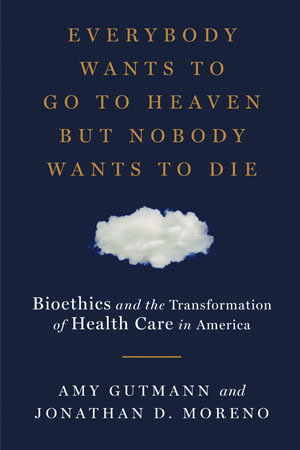Dr. Amy Gutmann is an internationally renowned scholar whose research addresses some of the most salient issues in contemporary society, including democratic deliberation, religious freedom, equal opportunity, race and multiculturalism, education, health care, and ethics and public affairs. Please download Dr. Gutmann’s full CV (PDF), and visit the “Meet the President” page for her extended biography.
An award-winning political scientist, Dr. Gutmann most recently co-authored Everybody Wants to Go to Heaven but Nobody Wants to Die: Bioethics and the Transformation of Health Care in America with Penn Integrates Knowledge Professor Jonathan Moreno. Published by W.W. Norton in August 2019, Gutmann and Moreno provide an eye-opening look at the inevitable moral choices that accompany medical progress. In 2020, they unveiled an afterword on pandemic ethics in the paperback version of their book. Dr. Gutmann, who oversees Penn’s academic medical center and health system—home to 13 FDA approvals for new treatments including the first personalized cellular therapy for cancer—chaired President Obama’s Bioethics Commission, of which Moreno served as a senior adviser.
In 2012, Dr. Gutmann and Dennis Thompson, of Harvard, published The Spirit of Compromise: Why Governing Demands It and Campaigning Undermines It, arguing that uncompromising mindsets lead ultimately only to the preservation of the status quo. The authors demonstrate that it is not political partisanship—strong partisans in fact often are effective in the art of political compromise—but rather the advent of “the perpetual campaign cycle” that contributes most to political stasis.
Dr. Gutmann’s systematic analysis of the role of education was summarized in Democratic Education, published in 1987, and expanded in 1999. This book has been translated into a dozen languages, and is widely taught in schools of education and in liberal arts curricula throughout the world. Democratic Education began a scholarly debate on the democratic governance of schools, and informs arguments on school choice, school vouchers, parental authority in education, and education for citizenship. Democratic Education was also the touchstone both for Dr. Gutmann’s subsequent work on deliberative democracy and for the values that she has advanced as a scholar and University president: freedom, opportunity, and mutual respect.
Another major scholarly contribution by Dr. Gutmann was made in the field of political philosophy: She and Thompson developed the conceptual framework for deliberative democracy as well as many of its applications in contemporary democracies. In Democracy and Disagreement, widely seen as the definitive book on this approach to democratic theory, the authors proposed deliberation not as a panacea, but rather as an antidote and alternative to coarseness, intransigence, and extremism degrading politics and public discourse in America. In 2004, Dr. Gutmann and Thompson followed up with Why Deliberative Democracy?
Dr. Gutmann’s scholarship in practical ethics grew from her foundational work on deliberative democracy. Her case study textbook (authored with Thompson) Ethics and Politics: Cases and Comments (fourth edition, 2005) builds on a course in ethics and public policy that she taught for many years at Princeton, and her vision of how deliberative democracy can be applied to pressing matters in practical ethics, including bioethics.
Dr. Gutmann’s 2004 Identity in Democracy focused on “the good, the bad, and the ugly” of identity politics. Identity-group politics, Gutmann showed, is not aberrant but inescapable in democracies because identity groups represent who people are, not only what they want—and who people are shapes what they demand from democratic politics. Rather than trying to abolish identity politics, Gutmann called upon society to distinguish between those demands of identity groups that aid and those that impede justice. Her book does justice to identity groups, while recognizing that they cannot be counted upon to do likewise to others.
Color Conscious: The Political Morality of Race was co-written by Dr. Gutmann and K. Anthony Appiah and published in 1998. The duo cleared the ground for a discussion of the place of race in politics and in peoples’ moral lives. Provocative and insightful, their essays tackled different aspects of the question of racial justice; together they provided a compelling response to a vexing problem in the U.S. “Color Conscious is an extremely welcome addition to the discourse on race,” world-renowned writer and Nobel laureate Toni Morrison said. “In different but complementary ways, Appiah and Gutmann articulate with precision and subtlety those intricate issues of race that confound us all.”
